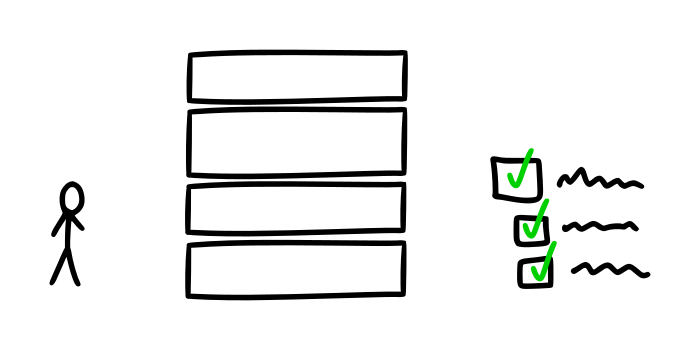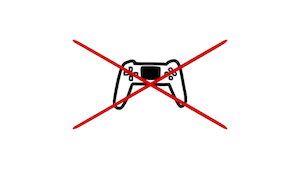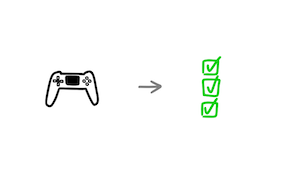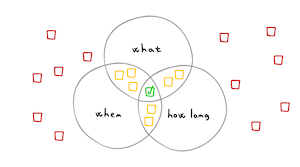4 common blocks to starting on any creative task

Procrastination is a bad habit of putting things off. Fortunately, we can all unlearn it.
But first, we have to understand why we procrastinate in the first place.
Here are 4 mistaken beliefs that lead us to procrastinate. The tricky thing is that most of the time, they're subsconscious.
1) I'll feel like it tomorrow
We all know it. There's a task that makes us uncomfortable and we really don't feel like doing it.
So we say to ourselves that we'll do it tomorrow. Tomorrow I'll feel like it.
The problem is that we naively think that we'll have more time in the future, that we'll be more productive and more disciplined, that we'll exercise and eat healthy and save money...
Why do we think we'll feel like doing things we don't like tomorrow?
Here are 2 reasons:
1) We have an unclear image of the future
We don't see all the plans and commitments. We'll probably have a packed schedule tomorrow, just like we have today.
2) Tomorrow feels less important than today
$1000 today has more value for us than $1005 tomorrow. We want to have fun today, not tomorrow. Tomorrow is for all the chores and obligations.
Because of our vague thoughts about what tomorrow holds and our tendency to value today more than tomorrow, we fall into the trap of thinking we'll feel more like doing something tomorrow than we do today.
Unfortunately, every time we decide to run away from our responsibilities, we strengthen the habit of procrastination.
You won't feel like it tomorrow, begin anyway
The problem with putting things off until tomorrow is that every time we wake up, it's today. And today we don't feel like it again. We snooze the alarm even though we said to ourselves to wake up early.
So when the thought of "I'll feel like it tomorrow crosses your mind," realize that you won't. You will feel the same as today.
The simple fact is that we don't feel like doing things most of the time (includes writing this blog for example). The most important thing is to start despite "not feeling like it."
Take 1 task you don't feel like doing and set a timer for 5 min. Just 5 min, no more, no less. You can do almost anything for 5 min. Go!
2) It has to be perfect on the first try
Often, we have an image of the perfect performance in our heads. Giving the perfect presentation, writing the perfect paper, making the perfect prototype.
And then the time comes to actually work on it and we can't. We can't even start.
Or we might start. Write the first sentence, make the first slide, draw the first line,... And then we stop and go check Twitter, Instagram, or Youtube.
Why? Because the ideal in our head doesn't match our current effort. Our try is nothing like our imagined perfect performance. It's pathetic.
So we escape on social media to make ourselves feel better.
What to do about it?
Make a sloppy first version
If perfect isn't going to happen, go with intentionally imperfect.
Did you know that at Harvard, there's a whole section of the library dedicated to first drafts of famous manuscripts?
They take aspiring authors there to see that great works of literature don't get created in one genius stint of brilliance, but step by step. The first drafts of famous books rarely resemble what millions of people got to read later.
In other words, the important step is to begin. Then you can improve and polish.
To ease off the pressure here's a dirty trick: begin intentionally badly.
Creating an important presentation? Start with a handful of notes on a napkin.
Writing a crucial email? Write a first version that would embarrass you.
Begin imperfectly because beginning perfectly is almost impossible.
3) There's a best way to start
When we want to begin working on a new project, we often instinctively look for the best way to approach it. Should I do this first or that first?
And so we think about beginning, and think, and think... and never actually start working because no task feels like the right one.
How not to do that?
Begin anywhere
There's probably a thousand ways of beginning any particular endeavor. You can start at the beginning of it, in the middle, or at the end. Or anywhere in between!
It rarely matters where we begin.
Once we begin working, we can fairly quickly see what needs to be done because our brain is engaged in problem solving mode.
4) Feeling like you have to do everything at once
Most tasks we need to finish (a thesis, a report for our boss, creating an app,...) require multiple sessions of focused effort. They can't be done in one day.
When we're faced with a task like that, it can stress us out. When we feel stressed, we stop thinking rationally and feel like we have to do it all at once.
Long, unclear lists of to-dos without clear time horizons will do that.
Take it bird by bird
Here's a short story that might help you:
Thirty years ago my older brother, who was ten years old at the time, was trying to get a report on birds written that he’d had three months to write, which was due the next day. We were out at our family cabin in Bolinas, and he was at the kitchen table close to tears, surrounded by binder paper and pencils and unopened books on birds, immobilized by the hugeness of the task ahead. Then my father sat down beside him, put his arm around my brother’s shoulder, and said, “Bird by bird, buddy. Just take it bird by bird.”
- Anne Lamott, Bird By Bird
A house doesn't get built at once, but brick by brick. In the same way, work or studying isn't a one-off event. There are steps.
A thesis is written word by word, an app written line by line of code, a painting stroke by stroke of the brush.
What's your "brick" that can help you get a step closer to the finished whole?
So there you have the 4 most common blocks to starting on any creative task and how to overcome them.
- Instead of thinking "I'll feel like it tomorrow," know that you probably won't and start anyway, despite not feeling like it.
- Instead of trying to make something perfect on your first try, intentionally make a sloppy first version.
- Instead of trying to find the best way to start, find some way to start and start!
- Instead of thinking that you have to finish everything at once, take it bird by bird, brick by brick, task by task.
That's it from us.
Now take at least one suggestion and use it to improve your daily life.
And remember, applying these strategies is a skill. The more you do it, the better you'll be at it, and the less you'll procrastinate.



